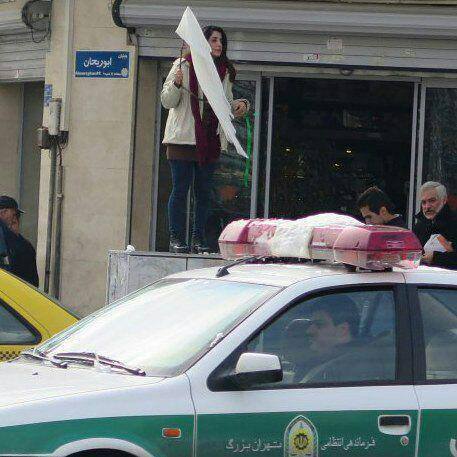Human Rights Watch has called on Iran’s regime to drop charges against women arrested over recent demonstrations about compulsory hijab.
HRW’s Sarah Leah Whitson said in Saturday’s report:
Now when women are peacefully protesting a discriminatory dress code, authorities are adding to their misdeeds by arresting them.
Security forces have seized dozens of women after the first demonstration, by 31-year-old mother Vida Movahed, on December 27. She was filmed climbing atop an electricaljunction box on one of the capital’s busiest thoroughfares, Enqelab (Revolution) Avenue, as she waved her white jihab on the end of a stick.
Movahed was arrested, as was a second woman who carried out a similar demonstration. But the detentions only fuelled further appearances by women — and some supportive men — waving the compulsory head covering.
On Wednesday, Shaparak Shajarizadeh was arrested in north Tehran. Family members told reporters that she has been beaten up in custody, before she was released on bail to stand trial yesterday.
On Thursday, police were filmed pushing Maryam Shariatmadari from a junction box. Reports say she is in prison with a broken leg.
And on Friday, Iranian police warned that “although the sentence for not wearing hijab is a two-month imprisonment, anyone encouraging others to take off their hijab would be jailed for 10 years”.
But prominent sociologist Fatemeh Sadeqi defied the threat, in a speech at Tehran’s Humanities Research Center, “No one can ignore these women any longer. Wherever there is a debate about women’s demands, it is also about the Girls of Revolution Street.”
“For decades Iranian authorities have imposed a compulsory dress code on women violating their basic freedom to express themselves and restricting access to economic and social opportunities for anyone who refuses,” said Sarah Leah Whitson, Middle East director at Human Rights Watch. “Now when women are peacefully protesting a discriminatory dress code, authorities are adding to their misdeeds by arresting them.”
The statement by HRW was made on February 24, one day after Iranian police threatened that Fars News Agency reported.
The statement is based on the police’s interpretation of article 639 of the Iranian penal code, which calls for one to 10 years of imprisonment for those convicted of “opening brothels” and “encouraging people to engage in prostitution.”
Iranians on social media angrily reacted to the statement released by the Police. Ali Mojtahedzadeh, an Iranian lawyer, wrote on his Twitter page: “The statement by the police has no legal value. The police are not in a position to interpret the law. They can simply enforce verdicts issued by judiciary authorities.”
Several Iranian women have been arrested during recent weeks for taking off their headscarf in public and protesting the compulsory hijab while standing on electric utility boxes.
Iranian Labor News Agency (ILNA) put the number of women arrested for protesting the hijab at 21 as of February 1.

